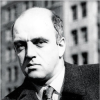James Fenton

James Fenton
James Martin Fenton FRSL FRSAis an English poet, journalist and literary critic. He is a former Oxford Professor of Poetry...
NationalityBritish
ProfessionPoet
Date of Birth25 April 1949
self musical doe
The composer does not want the self-sufficiency of a richly complex text: he or she wants to feel that the text is something in need of musical setting.
book men musical
Hearing that the same men who brought us 'South Park' were mounting a musical to be called 'The Book of Mormon,' we were tempted to turn away, as from an inevitable massacre.
beautiful lyric-poetry musical
Lyric poetry is, of course, musical in origin. I do know that what happened to poetry in the twentieth century was that it began to be written for the page. When it's a question of typography, why not? Poets have done beautiful things with typography - Apollinaire's 'Calligrammes,' that sort of thing.
art ask perhaps second sounds work
'What is this', and 'How is this done?' are the first two questions to ask of any work of art. The second question immediately illuminates the first, but it often doesn't get asked. Perhaps it sounds too technical. Perhaps it sounds pedestrian.
beauty form lyric mine nobody preserved published remains ruin
What I want, when I write a poem, is no more than this: that it be preserved in some published form so that, in principle, someone, somewhere, will be able to find it and read it. That is all I need, as a poet, and that is the beauty, the luxury of my position. My lyric is mine and remains mine. Nobody can ruin it.
mixture
Sometimes I have thought that a song should look disappointing on the page - a little thin, perhaps, a little repetitive, or a little on the obvious side, or a mixture of all of these things.
appears aware burial cut epitaph itself means original poem proper spoken term tomb written
The term 'epitaph' itself means 'something to be spoken at a burial or engraved upon a tomb.' When an epitaph is a poem written for a tomb, and appears in a book, we are aware that we are not reading it in its proper form: we are reading a reproduction. The original of the epitaph is the tomb itself, with its words cut into the stone.
aid enable poems rhyme themselves
Rhyme is a mnemonic device, an aid to the memory. And some poems are themselves mnemonics, that is to say, the whole purpose of the poem is to enable us to remember some information.
following forms goes indeed irregular known poet regular required rhyme scheme sequence whim
No poet is required to write in stanzas, or indeed in regular forms at all. Coleridge's 'Dejection: An Ode' has a rhyme scheme and sequence of long and short lines that goes without regular pattern, following the mood and whim of the poet. Such a form is known as an irregular ode.
alone artists modicum poem poet quite technology written
Working alone on a poem, a poet is of all artists the most free. The poem can be written with a modicum of technology, and can be published, in most cases, quite cheaply.
applies arouse dramatic itself rule song time yield
In song the same rule applies as in dramatic verse: the meaning must yield itself, or yield itself sufficiently to arouse the attention and interest, in real time.
avoid easier numbers odd pattern using
In my opinion, it is easier to avoid iambic rhythms, when writing in syllabics, if you create a line or pattern of lines using odd numbers of syllables.
along balance body cruises elastic face head holds horizontal imagine less looks man mask nose rest slip tilt tyranny wearing
It has to be displayed, this face, on a more or less horizontal plane. Imagine a man wearing a mask, and imagine that the elastic which holds the mask on has just broken, so that the man (rather than let the mask slip off) has to tilt his head back and balance the mask on his real face. This is the kind of tyranny which Lawson's face exerts over the rest of his body as he cruises along the corridors. He doesn't look down his nose at you, he looks along his nose.
advanced behind embarked left poetry reached
In the writing of poetry we never know anything for sure. We will never know if we have 'trained' or 'practised' enough. We will never be able to say that we have reached grade eight, or that we have left the grades behind and are now embarked on an advanced training.